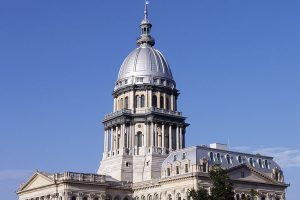ICOY and 20 other Health & Human Services Coalitions Call for Equity & Investment in Community Services
Publisher: Andi Durbin

Today, ICOY was joined by health & human service coalitions from across the state as we presented our Guiding Principles for Illinois’ Budget to legislators.
We thank ICOY members Audrey Pennington of Aunt Martha’s Health and Wellness, Dara Munson of Family Focus, and Sherrie Crabb of Arrowleaf for providing remarks during the meeting that underscored the importance of these guiding principles in relationship to their experience working with marginalized communities across Illinois, who rely on the critical services they provide.
We also greatly appreciate the participation of Sen. Melinda Bush, Sen. Julie Morrison, Rep. Tom Demmer, Rep. Jackie Haas, Rep. Theresa Mah, and Rep. Lamont Robinson who all attended today’s meeting.
As health and human service associations and coalitions representing thousands of community-based organizations across Illinois, we are grateful for the response of this administration and the legislature to the COVID-19 pandemic in the past year. We appreciate the work of the Black Caucus in centering healthcare and human services as a pillar of their agenda and echo the importance of erasing the artificial line between health and human services.
While health and human services are always important components of a strong state, the current crisis facing Illinois elevates health and human services to the highest priority level for the General Assembly and the Governor as they approach the FY22 budget.
The health and human service organizations we represent play a fundamental role in preventing hospitalizations and addressing the increased demand for services – including childcare, access to food, housing, mental health services, care for those with disabilities, and healthcare for our most underserved populations. Many of these providers were already in precarious fiscal situations prior to the COVID-19 pandemic. But these health and human service organizations have risen to the challenge to address the needs of their communities and will continue to pick up the pieces long after this pandemic is over.
Further, health and human services are an essential part of a robust economy; these services will play a critical role as we rebuild Illinois, ensuring that people are healthy, stable, and able to work. Illinois will not succeed without the health and human services sector. Collectively, we contribute $4.5 billion to the economy annually, while serving millions of Illinoisans. We make it possible for all Illinoisans to realize their potential, care for their families, and contribute to their communities.
As such, we are asking the legislature to prioritize funding for health and human services for FY22, and that the following principles guide their decision-making.
- In the midst of a pandemic, the FY22 health and human services budget must ensure that people and communities have access to essential services, including services that address the social determinants of health, economic support, and family well-being. It must include funding to accommodate the increasing number of people in need of health and human services, continue to reimburse for remote services, and promote flexibility to adapt to evolving needs.
- The FY22 health and human services budget should prioritize funding for those hardest hit by the pandemic, including Black, Brown, and rural communities. The budget must reflect the needs of those who have been disproportionately impacted by systemic racism, which has been exacerbated by COVID-19.
- The FY22 health and human services budget should avoid historic silos and take a holistic approach to budgeting, understanding how the various state departments and their programs interact with and impact each other. For example, cuts in some areas can lead to higher rates of hospitalization, incarceration, and increased intakes into the foster care system. It is important that the General Assembly recognize that some “savings” do not actually save any money. Instead, they simply transfer where money is spent, at the cost of greater human suffering. We must avoid this short-sighted and costly strategy of short-term cuts, and instead invest in prevention and early intervention to prevent suffering and control costs over the long term.
- The FY22 health and human services budget should reflect that the health and human services workforce is disproportionately female, disproportionately people of color, and disproportionately low- to moderate-income people who have been acting as essential workers shouldering the burden of care in this pandemic. We must recognize this dynamic and invest in the human services workforce both as a matter of equity and to ensure the sector is able to attract, support, and retain talented and committed individuals.
- The FY22 budget should seek new means of revenue including, but not limited to, closing loopholes and corporate perks, and invest those revenues in health and human services that will help hasten Illinois’ recovery from the pandemic.
The coalition of organizations sponsoring today’s event represents thousands of community providers across the state and includes:
- ACT Now! Afterschool for Children and Teens
- The Arc of Illinois
- Association of Community Mental Health Authorities of Illinois
- Campaign for Healthy Illinois
- Chicago Coalition for the Homeless
- Children’s Advocacy Centers of Illinois
- Community Behavioral Healthcare Association
- Coordinated Care Alliance
- Forefront
- IARF
- Illinois Coalition Against Domestic Violence
- Illinois Coalition Against Sexual Assault
- Illinois Network of Centers for Independent Living
- Illinois Partners for Human Service
- Illinois Primary Health Care Association
- The Illinois State Alliance of YMCAs
- Institute on Public Policy for People with Disabilities
- The Sargent Shriver Center on Poverty Law
- Start Early
- Supportive Housing Providers Association
Uncategorized






